Listen to the article - it is faster than reading!
Web development is a dynamic field where changes happen at an incredible pace. New technologies, approaches, and frameworks emerge almost every year, making it increasingly challenging to stay updated. I’ve always believed that the best books are a fundamental source of knowledge that not only help you grasp the basics but also dive into the deeper aspects of the profession. In 2025, to remain competitive, web developers must focus on trusted sources. In this article, I’d like to share my personal top picks for books that I recommend to anyone looking to grow in this field.
What Are the Benefits of Best Web Development Books?
Learning from books offers several significant advantages, especially when it comes to foundational technologies like HTML, CSS, and JavaScript. I believe books allow for a deeper understanding of the subject while presenting material in a structured way. Here are the main benefits of using books for web development:
- Provide verified and structured information.
- Allow for step-by-step, sequential learning.
- Offer examples that help clarify concepts.
- Focus on practical applications of knowledge.
- Can be used without the need for an internet connection.
- Offer the author’s perspective, giving a fresh angle on problems.
- Explore deeper aspects and details that are rarely found in online materials.
Which Books Every Web Developer Should to Read in 2025?
There are many textbooks worth exploring, but I’ve compiled a list of the top ten. These top web development books provide both foundational and advanced knowledge. Below, I’ve briefly described each of them in a table.
| Title of front end web development books | Author(s) | Main Features |
| "HTML, CSS, & JavaScript All-in-One For Dummies" | Paul McFedries | A comprehensive resource for beginners. |
| "JavaScript from Beginner to Professional" | Laurence Lars Svekis, Maaike van Putten, Rob Percival | Great for in-depth learning of JavaScript. |
| "HTML and CSS: The Comprehensive Guide" | Jürgen Wolf | A complete reference for HTML and CSS. |
| "Mastering JavaScript Functional Programming" | Federico Kereki | Dives into functional programming with JavaScript. |
| "Teach Yourself VISUALLY™ HTML and CSS" | Guy Hart-Davis | A visual approach to learning HTML and CSS. |
| "HTML5 Programming: The Essential Guide to HTML5" | Neo D. Truman | A modern guide to HTML5. |
| "HTML and CSS: Visual QuickStart Guide" | Joe Casabona | A straightforward and accessible book for beginners. |
| "Professional JavaScript for Web Developers" | Matt Frisbie | A detailed guide for professionals. |
| "JavaScript for Web Warriors" | Patrick Carey, Sasha Vodnik | Practical examples and approaches for development. |
| "JavaScript Crash Course" | Nick Morgan | An intensive course on JavaScript fundamentals. |
HTML, CSS, & JavaScript All-in-One For Dummies. Paul McFedries
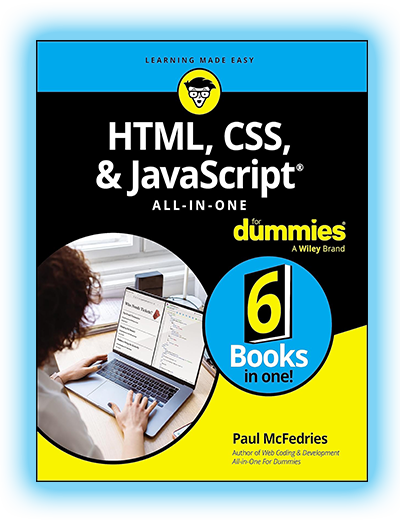
This book is considered the perfect starting point for those new to web development. It covers the basics of HTML, CSS, and JavaScript, making it a versatile choice. The book uses an accessible, step-by-step approach, making even complex concepts easy to grasp. The author shares practical recommendations that help readers apply what they've learned in real-world scenarios.
Why You Should Read It:
- Structured Learning: Enables sequential mastery of three core technologies.
- Beginner-Friendly: Explains basic concepts in simple language.
- Code Examples: Packed with practical examples.
- Relevant Tips: Updated with modern standards in mind.
- Ease of Understanding: No complicated terminology—everything is explained clearly.
JavaScript from Beginner to Professional. Laurence Lars Svekis, Maaike van Putten, Rob Percival

This guide, in my opinion, is an excellent resource for those looking to learn JavaScript from scratch and progress to a professional level. It covers a wide range of topics, from basic syntax to advanced concepts like asynchronous programming. The authors emphasize practical aspects, offering tasks and examples for self-practice.
Why You Should Read It:
- In-Depth Learning: Covers all major aspects of JavaScript.
- Practical Focus: Each chapter includes tasks for independent practice.
- Modern Approaches: Discusses new standards and features of the language.
- Diverse Topics: Covers basic and advanced topics, including working with the DOM and AJAX.
- Authoritative Authors: Written by experienced experts whose insights are valuable for real-world work.
HTML and CSS: The Comprehensive Guide. Jürgen Wolf
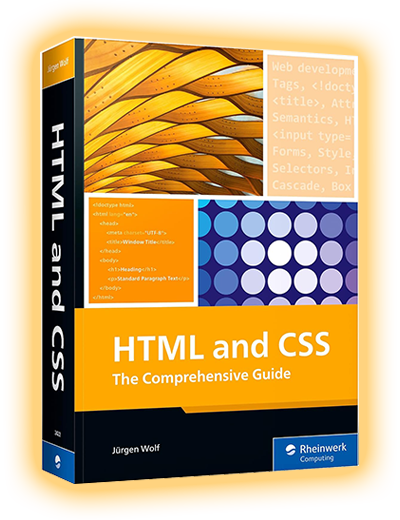
This book is considered a true encyclopedia of HTML and CSS. I recommend it to anyone looking to deeply understand the structure and style of web pages. The author focuses not only on the basics but also on more advanced concepts, such as responsive design and working with CSS animations. It includes numerous examples and solutions that benefit developers of all levels.
Why You Should Read It:
- Comprehensive Coverage: Explores all aspects of HTML and CSS, including rare and complex cases.
- Practical Focus: Features examples from real-world development.
- Suitable for All Levels: Useful for beginners and experienced developers alike.
- Updated Content: Covers new HTML5 and CSS3 elements.
- Reference Material: Excellent for ongoing use as a reference guide.
Mastering JavaScript Functional Programming. Federico Kereki
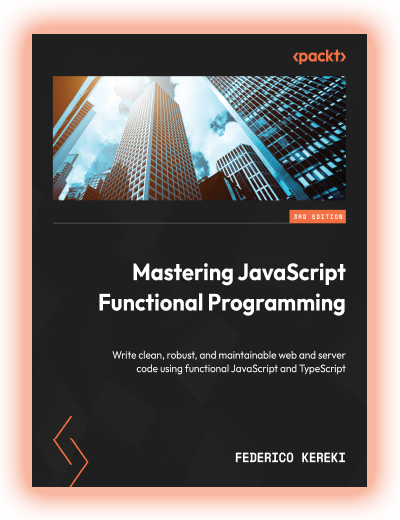
In my opinion, functional programming is one of the key topics every modern web developer should master. This book is ideal for those looking to write clean, maintainable, and efficient code. It thoroughly explains concepts such as currying, composition, and working with immutability.
Why You Should Read It:
- In-Depth Approach: Covers both basic and advanced concepts of functional programming.
- Real-World Examples: Filled with practical exercises.
- Modern Practices: Discusses ES6+ features.
- Skill Enhancement: Helps improve code style and readability.
- Performance Focus: Guides you in creating efficient and reliable applications.
Teach Yourself VISUALLY™ HTML and CSS. Guy Hart-Davis
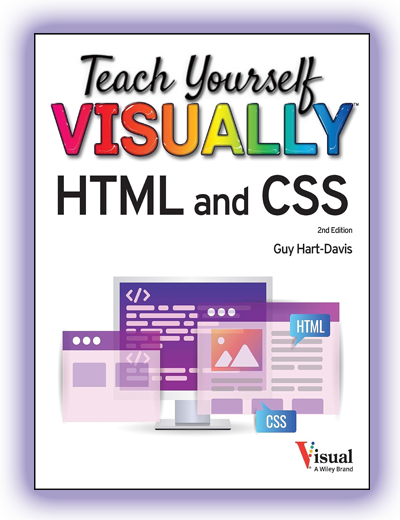
This book is considered ideal for visual learners. It helps simplify complex concepts through illustrations and examples. The author uses a step-by-step approach that makes it easy to acquire essential HTML and CSS skills. Thanks to its visual teaching style, the material is absorbed faster and more effectively.
Why You Should Read It:
- Visualization: Every concept is accompanied by graphical examples.
- Simplicity: Explains even complex topics in a clear, understandable way.
- Practical Exercises: Includes examples to reinforce learning.
- Beginner-Friendly: An excellent choice for getting started.
- Comprehensive Topics: Covers both basic and advanced aspects of HTML and CSS.
HTML5 Programming: The Essential Guide to HTML5. Neo D. Truman
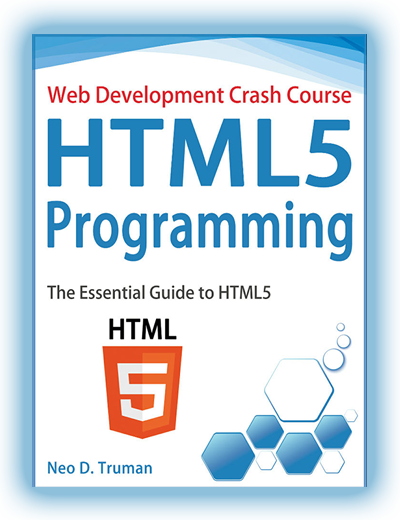
HTML5 is the foundation of modern web applications, and this book is perfect for exploring all its aspects. The author dives deeply into topics like working with Canvas, multimedia elements, and WebSockets. This guide helps not only to master the theory but also to apply it in practice.
Why You Should Read It:
- Focus: Entirely dedicated to HTML5 and its capabilities.
- Modern Examples: Includes practical use cases.
- Depth: Covers both basic and complex elements.
- Practical Tips: Helps avoid common mistakes.
- Project Preparation: A valuable resource for real-world projects.
HTML and CSS: Visual QuickStart Guide. Joe Casabona
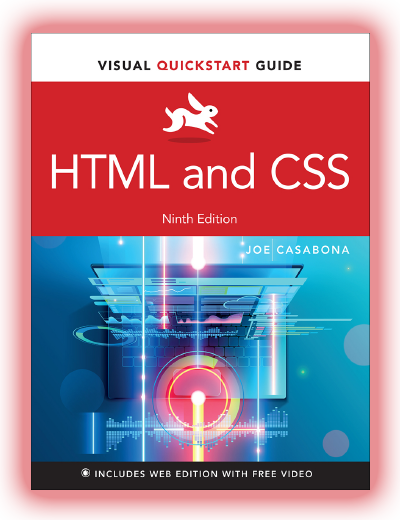
In my opinion, this book is perfect for those taking their first steps in web development. It is written in accessible language and helps quickly grasp key concepts. The author emphasizes the practical application of knowledge, which is especially important for beginner developers.
Why You Should Read It:
- Simple Presentation: Ideal for beginners.
- Quick Navigation: Easy to find the information you need.
- Practical Exercises: Plenty of tasks for self-study.
- Relevant Examples: Covers modern standards.
- Ease of Use: Perfect for daily practice.
Professional JavaScript for Web Developers. Matt Frisbie
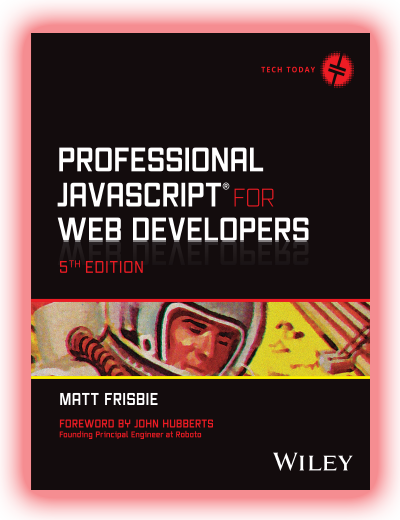
JavaScript is the backbone of modern web development, and this book helps you master it at a professional level. The author delves deeply into the subject, starting with basic syntax and progressing to advanced topics like working with frameworks and optimizing performance. This manual is an excellent tool for anyone looking to level up their skills.
Why You Should Read It:
- Comprehensive Content: Covers all aspects of the language, including new standards.
- Practical Examples: Includes real-world development cases.
- Professional Focus: Useful for advanced learning.
- Modern Approaches: Updated with the latest trends.
- Structured Chapters: Logically organized for easy navigation.
JavaScript for Web Warriors. Patrick Carey, Sasha Vodnik

This guide turns learning JavaScript into an engaging process with a focus on practical skills. It emphasizes solving real-world problems and includes numerous interactive examples. The authors provide detailed explanations of complex concepts, making this book an excellent choice for developers of all skill levels.
Why You Should Read It:
- Practical Focus: Geared toward solving real-world problems.
- Modern Examples: Covers up-to-date techniques.
- Interactivity: Exercises reinforce knowledge.
- Detailed Explanations: Addresses complex aspects of the language.
- Efficiency: Helps quickly master essential skills.
JavaScript Crash Course. Nick Morgan
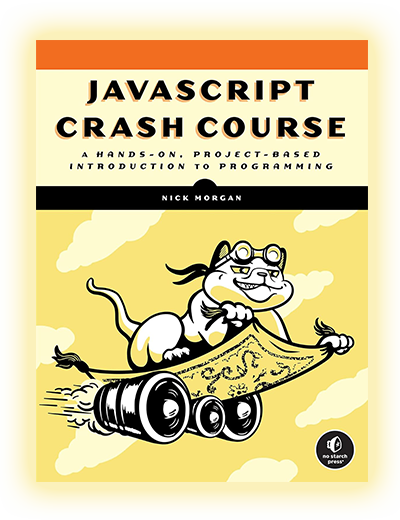
This book is designed for those who want to learn JavaScript quickly and effectively. The author offers an intensive approach, helping readers master basic and intermediate skills in a short time. Packed with examples and practical exercises, this guide makes the learning process as productive as possible.
Why You Should Read This Book:
- Intensity: Quickly dives into the fundamentals.
- Simplicity: Suitable for those just starting out.
- Practical Focus: Includes numerous exercises to reinforce learning.
- Modernity: Covers up-to-date standards.
- Logical Presentation: Material is presented in the most simplified manner.
Conclusion
Good web development books are a reliable source of knowledge that help developers grow both technically and professionally. I believe that in 2025, every web developer should focus on foundational aspects like HTML, CSS, and JavaScript. It's essential not just to read textbooks but to apply the knowledge in practice. I hope this list helps you choose the right direction for your development journey.
Frequently Asked Questions
Question 1: Can I learn web development from books?
Yes, top web development books are an excellent tool for learning web development. They provide structured information and a sequential presentation of material. Authors often share practical experience, offering a deeper understanding of technologies. However, for successful learning, it’s crucial to combine reading with practice to solidify your knowledge and learn how to apply it in real projects.
Question 2: Can I self teach web development?
Yes, it’s entirely possible to learn web development independently. There are plenty of resources available today, including books, online courses, documentation, and forums. Discipline and organized study are key—start with foundational technologies like HTML, CSS, and JavaScript. Practice is essential: build projects, debug errors, and improve your skills throughout the learning process.
Question 3: Can I learn web development in 2 years?
Yes, you can master all foundational and some advanced aspects of web development within two years. It depends on the intensity of your studies and the time you dedicate to practice. Start by learning the basics of HTML, CSS, and JS, then move on to more advanced topics like frameworks and backend development. Consistent practice and participation in real projects will help you achieve significant results.
Question 4: Will web development exist in 10 years?
Yes, web development will remain a sought-after profession for the next 10–20 years. The internet continues to evolve, and the demand for high-quality web applications and websites is only growing. Additionally, emerging technologies like artificial intelligence and blockchain create new opportunities for developers who are ready to adapt and learn new tools.
Question 5: Can I master JavaScript in 2 years?
Yes, you can achieve a strong proficiency in JavaScript within two years. Start with fundamental concepts such as variables, functions, and DOM manipulation, then move on to more advanced topics like asynchronous programming and frameworks. Regular practice, reading documentation, and working on projects will deepen your knowledge and prepare you for professional development.
Question 6: Will AI replace web developers?
No, AI is unlikely to completely replace web developers. While AI tools can automate some tasks like template creation or code generation, creativity, understanding business requirements, and crafting unique solutions are inherently human skills. Instead of replacing developers, AI will serve as a valuable tool to enhance their efficiency.
Question 7: Is Web Dev a stressful job?
Web development can be stressful, like any other job that involves meeting deadlines and solving complex problems. However, the stress level depends on work organization and time management skills. If you can effectively prioritize tasks and maintain a balance between work and rest, web development can become an engaging and enjoyable profession.

